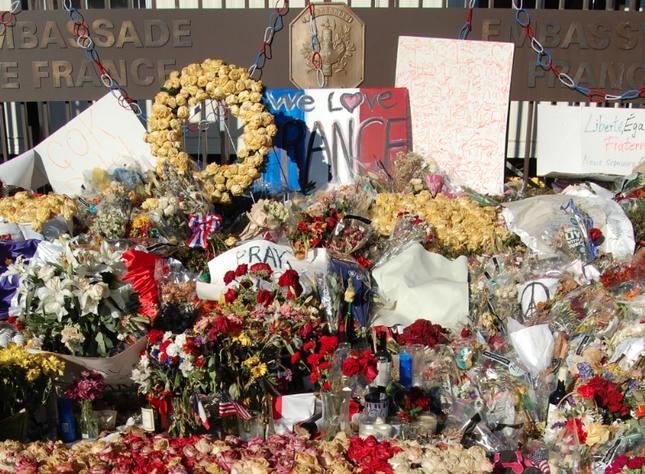Love Letter to France: Merci to the Life and the Gifts of the French
By • December 2, 2015 0 976

It has been almost three weeks since the Nov. 13 terrorist and ISIL-credited attacks shocked the world and struck Paris like a knife in the heart.
The world has not forgotten what happened—nor has there been a let-up in commemoration, eulogizing and remembering the victims.
But the events and their aftermaths have also resulted into other things.
They have seeped almost preternaturally into the American presidential campaign, where fear-mongering and dark arts of demagoguery are practiced routinely as a response to everything from keeping us safe to the very real refugee crisis.
Other things happen. As of this writing, Paris is again the center of the world, as it hosts a United Nations global warming gathering attended by world leaders and demonstrators. In the U.S., the debate over race and crime has again stirred in Chicago, while in Colorado, one of our homegrown shooters managed to kill three persons, including a police officer, at a Planned Parenthood clinic.
Still, it’s hard to forget Paris. A flowered memorial still graced the entrance to the French Embassy last week. We shouldn’t forget. Not the terrible acts themselves, and the terrible losses of and for so many people. But more than that, we should remember France and the city of light, every day.
The terrorist struck at the heart of Paris and what it offers to the world, what the French have always offered. What is it, after all, what the rest of the world loves about France, French and Paris, but what they have contributed to the richness of life and its pure, deep and sometimes light-hearted enjoyment.
We sing songs about France and the French, revel in how its very language can add both spice, sweetness, and a kind of beauty to even the ugliest of words and concepts. Say a word or phrase in French, and it somehow becomes enriched, better. It is a kind of gift of garnish and transformation.
As with some of those killed during the attacks, we want to be in some Parisian café, talking amicably about politics, movies, the great philosophical issues of the times, without rancor, with good or not so good wine, even when it rains.
We can utter a movie cliché and make it perfectly apt in these our times: We will always have Paris. For this, we want to thank the French people, for their gifts to our memories.
In the desire to travel, Paris is always on the mind’s list of someday.
If you’ve ever had the chance to spend time in Paris, the memories are indelible—memories we carry around with gratitude. So, from a trip several years ago, we remember attending Easter Sunday Mass in the Cathedral of Notre Dame de Paris—celebrated in French, of course. We recall walking in the rain everywhere, the poodle in the restaurant, the carousel, hearing “The Four Seasons” by candlelight in the king’s chapel, at the Pompidou, the art, the art everywhere, at the Pompidou, the Louvre, in small galleries, and on the streets and we remember the view of the city from the top of the Pompidou, the bustle and cobbled street, the view of Rue St. Germaine, the church across the street built in the year 900, the chocolate, the cats at the cemetery, the river flowing, and the mist over everything.
Merci, even, to the waiter who yelled at me in outrage for wanting to put mustard on cheese and refused to bring it.
We carry the culture with us, the writers, the books, the philosophers. We say merci for Sartre, who allowed us to understand a joke about existentialism in a Woody Allen movie, and for Camus and his loner’s empathy. We still remember the books by Dumas, Hugo, Flaubert, Stendahl, and thank them for Quasimodo and Esmerelda, for Javert and Valjean, for D’Artagnan, Athos, Porthos and Aramis and “The Count of Monte Christo” and for “Madame Bovary.” Merci for Edith Piaf, for Jacques Brel, for the boulevardiers. Thank you for giving us not just movies, but cinema and films made by Truffaut, Renoir (the younger) Godard, Resnais, Chabrol and the stars and faces of Montand, Moreau, Signoret, Deneuve, Binochet, Gabin, Belmondo and Jacques Tati.
Thanks also for all the painters and artists and impressionists who made such an impression: the ballerinas of Degas, the colors of the picnic of Renoir, of Monet and Manet and Matisse and Cezanne.
Where did the ideas of liberty and freedom come from but the Enlightenment? From Voltaire and Diderot, and who was our staunchest allies in our revolution which precipitated the French Revolution, for better and worse. That statue from in New York Harbor is a French gift and a French idea, even in these times.
By attacking people in the midst of life, in the midst of dinner and conversation, and even loud music, the terrorist were attacking something that is not a French invention, but is nevertheless a French expression, the desire to live life fully, a “joie de vivre.”
That is their gift to all on your good earth, nevertheless, and for which we say to our French compatriots, “Merci.”

